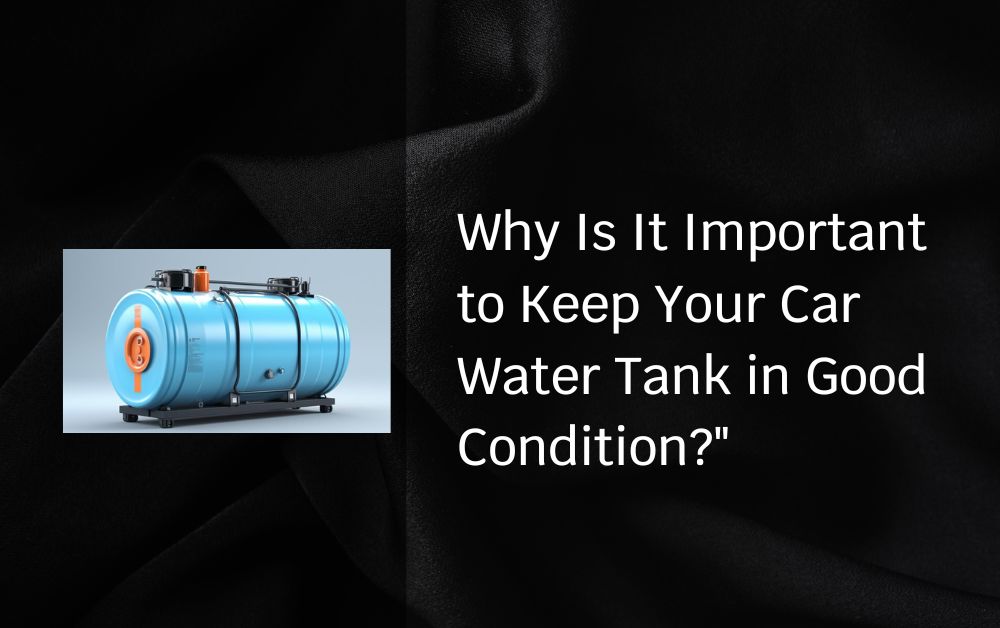Keeping your car’s water tank in good condition is crucial for the health and efficiency of your vehicle. Also known as the coolant reservoir, the water tank plays a vital role in managing the engine’s temperature and preventing overheating. A well-maintained water tank helps ensure that your car runs smoothly, safely, and efficiently. In this article, we will explore the importance of the water tank, the problems associated with neglecting it, and tips on how to maintain it properly.
Understanding the Role of Your Car’s Water Tank
The car water tank, while seemingly simple, performs several critical functions in the operation of your car’s cooling system. Knowing its role can help you appreciate why it’s essential to keep it in top condition.
What Is the Water Tank?
The water tank, often referred to as the coolant reservoir, is a container that holds the cooling fluid, or coolant, which is a mixture of water and antifreeze. This fluid circulates through the engine to absorb heat, helping to regulate the engine’s temperature.
How Does the Water Tank Work?
When your engine runs, it generates heat. The coolant absorbs this heat and travels to the radiator where it is cooled down by air passing through the radiator’s fins. As the coolant expands from the heat, excess coolant flows into the water tank. When the engine cools down, the coolant contracts and the surplus coolant is sucked back into the engine from the tank. This cycle keeps the engine from overheating.
The Importance of Maintaining Your Car’s Water Tank
Maintaining your car’s water tank is essential for several reasons, impacting everything from engine performance to the longevity of your vehicle.
Prevents Engine Overheating
The primary benefit of a well-maintained water tank is the prevention of engine overheating. Overheating can cause serious damage to engine components, potentially leading to engine failure.
Protects Engine Parts
Keeping the water tank in good condition ensures that there is always enough coolant available to absorb and dissipate heat, protecting engine parts from the damage caused by excessive heat.
Enhances Vehicle Performance
A properly functioning cooling system, including the water tank, allows the engine to operate at an optimal temperature, which enhances overall vehicle performance.
Improves Fuel Efficiency
An engine that operates at the correct temperature runs more efficiently and uses fuel more effectively, which can improve your car’s fuel economy.
Extends Engine Life
Regular maintenance of the water tank helps extend the life of your engine by ensuring it runs within the recommended temperature range, thus avoiding the stress and strain of operating under extreme heat.
Reduces the Risk of Breakdowns
By preventing overheating, a well-maintained water tank reduces the likelihood of breakdowns and costly repairs, thereby ensuring reliability and longevity of your vehicle.
Common Problems with Neglecting the Water Tank
Failing to maintain the water tank can lead to several issues that could compromise the efficiency and safety of your vehicle.
Corrosion and Leaks
Over time, the coolant in the water tank can become acidic and corrode the tank and cooling system components. This can lead to leaks, which may cause the coolant level to drop too low, preventing adequate cooling of the engine.
Engine Overheating
Without proper maintenance, the water tank and the entire cooling system can fail to regulate the engine temperature, leading to overheating. This can severely damage the engine and may result in a complete engine rebuild or replacement.
Increased Wear and Tear
If the water tank is not properly maintained, contaminants in old coolant can accelerate wear and tear on the water pump, radiator, and hoses, leading to premature failures and increased repair costs.
Tips for Maintaining Your Car’s Water Tank

Keeping your car’s water tank in good condition is straightforward if you follow a regular maintenance schedule.
Regularly Check Coolant Levels
Make it a habit to check the coolant level in the water tank regularly. Ensure that it is always filled to the manufacturer’s recommended level.
Inspect for Leaks and Damage
Regularly inspect the water tank and associated hoses for any signs of leaks, cracks, or damage. Early detection can prevent more serious issues down the road.
Replace the Coolant as Recommended
Coolant doesn’t last forever. Over time, it can break down and become less effective at cooling your engine. Follow your manufacturer’s recommendations for how often to change the coolant in your water tank.
Keep the Water Tank Clean
Ensure the exterior of the water tank is clean from dirt and debris, which can affect its functionality. A clean water tank can help ensure that the coolant remains effective for longer.
Conclusion
The water tank is a critical component of your vehicle’s cooling system. Maintaining it in good condition is essential for ensuring that your engine runs efficiently, performs well, and has a long operational life. Regular checks, timely coolant replacement, and keeping an eye out for leaks can help keep your water tank and cooling system functioning correctly. By taking good care of your water tank, you are not just safeguarding your vehicle; you are also ensuring a safer and more reliable driving experience.
Related Posts
QiuQiu99: Your Trusted Hub for Easy Wins in Online Slot Gambling
and a wide variety of slot games, QiuQiu99 has gained…

Mengenal Lebih Dalam Jenis Permainan Slot: Mahjong Ways 2, Slot Terbaik Setiap Tahunnya
Permainan slot adalah salah satu jenis hiburan yang paling populer…

Affordable and Convenient: Cheap Airport Car Rental Agency in Belize – Tropical Car Rental
When it comes to traveling to Belize, getting around efficiently…

